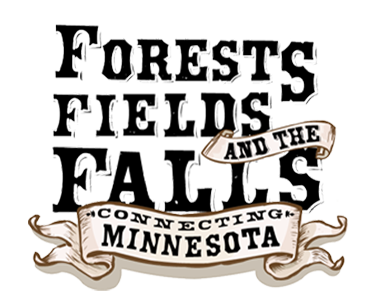Image
Forests, Fields and the Falls Home



It was on November 28, 1899, at the age of 21, that I left Minneapolis by train for Aitkin to spend the first of three winters in the woods.


In those days, hundreds of lumberjacks came into Aitkin in the spring and the fall on their way to and from the logging camps.
On December 4th I started to walk to the Moose River Camp 28 miles north of Aitkin.
We crossed the Mississippi on the old bridge and walked up the "river road."


Our camp was located about three miles from Moose Lake where the logs were dumped to be driven down the Moose River into the Mississippi in the spring.
The camp was constructed of Norway pine logs and consisted of the sleeping camp, the cooking camp, a small office, and the stables.

The timber around the camp was about 80% white pine.

The largest tree I saw cut in my three winters in the woods was a white pine over five feet in diameter. I often went to look at this tree before it was cut. It was just like an old friend.

timber (noun): Trees in a forest regarded as a source of wood.

The men who chopped the falling cut in the trees were called the undercutters. They were skilled in the use of the double-bitted axe.
The undercutters knew just where to "notch" the tree to make it fall in the right direction.
double-bitted axe (noun): An axe that had two sharp edges for chopping.
After the tree was down, the undercutters marked the 12, 14, 16 and 18-foot lengths on the fallen trunk, so the sawyers could cut the tree into logs.



Then a man and a pair of horses, together with a cant hook man, skidded the logs to the rollways that were located parallel to the logging road.

cant hook (noun): Tool used to grip and roll logs.
rollways (noun): A path where logs were rolled into the river.

The roads were a remarkable feat of rough engineering. They were laid out to tap each bunch of timber and still maintain level or slightly downhill grades from the timber to the landing.


feat (noun): A relatively rare or difficult accomplishment.
tap (verb): To deplete.
landing (noun): A place on a shoreline where a boat lands.
The logs were very heavy and getting them onto the sleds was one of the most difficult and dangerous jobs. The horses pulled while the cant hook man pried and rolled the logs up a ramp.

This hard work made the men hungry. Although the noon meal was served in the woods, we ate breakfast and supper in camp.

The cook announced meals by ringing the familiar triangle, although it wasn't really necessary because everyone was waiting to eat.
"Pork and Beans" was the staple item in the lumberjack's diet. Sometimes it was served three times a day.

Everyone was usually in bed by 8:00 or 8:30 p.m. except on Saturday night when the men stayed up until 9:00 or 9:30 singing, telling stories and playing games.


In spring, it was time for the log drive down the Mississippi.

At the outlet, where the dam was located, men guided the logs, a few at a time, into the sluiceways; and the drive was on.

The drive took place during the long days of May and June...
and the men worked from dawn until dark.

outlet (noun): A river that runs out of a lake.
sluiceways (noun): A man-made channel designed to redirect excess water.
drive (noun): An act of moving logs forward to be captured.

The drive to the Mississippi took a month. The distance in a straight line was about 14 miles, but it was two or three times that much by stream.
When the logs finally arrived at the Mississippi...
They began their long journey to Minneapolis...










